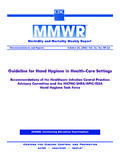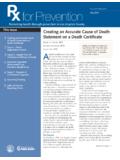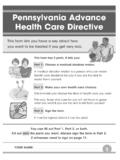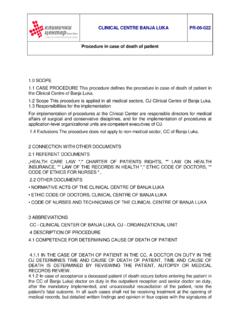Transcription of WHEN A PERSON DIES The HOSPITAL AUTOPSY …
1 when A PERSON DIEST heinformation for family and friendsAHOSPITAL AUTOPSY PROCESSI ntroduction2 What is an AUTOPSY ?3 Time frame for an autopsyWhat are the benefits of an AUTOPSY ?4 Who decides if there should be an AUTOPSY ?5 Coronial autopsyHospital autopsyWho gives permission for an AUTOPSY ?7 Are there alternatives to a full AUTOPSY ?8Is it possible to donate organs or tissues for transplantation? 9 Are any organs or tissues retained after an AUTOPSY ?10 Organs and tissues retained for research and educationWhat are the options for return or disposal of organs?11 How do I find out about the results of the AUTOPSY ?12 when can funeral arrangements be made?
2 13 What support is available to you?14 Cultural and religious supportInformation in other languagesMementosInformation and bereavement support1 CcontentsIntroductionThis booklet has been prepared to provide information abouthospital autopsies. It explains what an auopsy is, why it isconsidered important and the choices you can make. You havethe right not to know and not to you do want to know more, we ask that you read this bookletbefore making any decisions. If you do agree to an autopsyyou will need to complete a form which will be given to people find this a difficult time to be making decisions. Ifyou have any questions you should ask the HOSPITAL staff whodiscuss the AUTOPSY with you.
3 It often helps if you speak withyour family, your doctor or someone close to is an AUTOPSY ?An AUTOPSY (also known as a post-mortem examination) is astep-by-step examination of the outside of the body and of theinternal organs1by a doctor called a pathologist, who isspecially trained in this type of work. The AUTOPSY is carried outin a mortuary in a respectful manner and with regard to thewishes of the body is opened by making incisions in the chest, abdomenand head so that the organs can be removed and AUTOPSY , small tissue2samples are taken for detailedexamination under a some body tissues and organs require specialisedexamination and it may be necessary to retain entire organs fora more detailed the AUTOPSY is completed, the incisions are carefullyclosed but can be seen if the body is uncovered.
4 A normalviewing of the body can be held after an frame for an autopsyThe AUTOPSY is performed as soon as possible after permissionhas been given by the senior available next of kin. This isusually within 48 hours after death has organ is made up of a collection of different tissues which forma distinct structure in the body and perform a particular function eg. heart, brain, liver, tissue is a small sample (typically about thick) usually taken and prepared for examination under the AUTOPSY will provide detailed information about whatcaused the PERSON s death. Even if the cause of death seemsclear, the PERSON may have had a medical problem that wasnot known during AUTOPSY may identify an undiagnosed infection, cancer,blockage in a blood vessel, a genetic disorder or acomplication of treatment.
5 This information can be important forother family members future health and to help them come toterms with the are the benefitsof an AUTOPSY ?5 Wwho decides if thereshould be an AUTOPSY ?Coronial autopsyA death in a HOSPITAL is reported to the Coroner if it hasoccurred in the following ways:within 24 hours of admission (if the death is not thought to be from natural causes),if death occurs during an anaesthetic procedure or within 24 hours of the PERSON having an anaesthetic, if a PERSON is certified by a doctor as "Dead on Arrival" at a circumstances in which a death is reported to the Coronerinclude death from unusual, suspicious or unknown causes, orunexpectedly.
6 These may include assault, accident and in some other situations, such as deaths in custody andsome deaths in institutions, must also be does not have to be anything suspicious about the deathfor the Coroner to be involved. The Coroner s role is toestablish the cause and circumstances of the Coroner requests an AUTOPSY to be performed, permissionfrom the family is not required for a coronial AUTOPSY to takeplace, but it is important the family is booklet provides information about HOSPITAL (non-coronial)autopsies only, for more information about coronial autopsiesplease contact the Social Worker at the State Coroner s Officeby phoning (08)
7 8204 autopsyThe family may ask the doctor to arrange for an AUTOPSY to beperformed, or a doctor may ask the family for permission tocarry out an AUTOPSY to help find out why the PERSON HOSPITAL AUTOPSY is not performed without seeking thepermission of the staff will respect and support whatever decision thesenior available next of kin makes about a HOSPITAL senior available next of kin is the PERSON who will beasked to give permission for an AUTOPSY to be performed. Heor she will be required to sign an AUTOPSY Request andAuthority order of priority, the senior available next of kin is the:spouse, son or daughter over 18 years, parent, brother or sister over 18 a child has died, the senior available next of kin in order ofpriority is the:parent, sister or brother over 18 years, guardian of the copy of the completed AUTOPSY Request and Authority Formwill be provided to this you have any questions about this process, you should discussthese with the medical officer seeking permission for gives permissionfor an AUTOPSY ?
8 8 when you give permission for an AUTOPSY to be performed,you can decide if you want a full AUTOPSY or a limited autopsyto be carried full AUTOPSY involves a detailed examination of all the internalorgans including the brain, heart, lungs, liver, kidneys, intestines,stomach, reproductive organs, blood vessels and small may only want to give permission for a limited will need to indicate on the AUTOPSY Request and Authorityform the part or areas of the body that you do not want to haveexamined. This will limit the information gained but will still bea valuable procedure. The HOSPITAL will respect your matter can be discussed with the HOSPITAL staff member whospeaks to you about the there alternativesto a full AUTOPSY ?
9 Many people have indicated their desire to be an organdonor after their death. The PERSON may have done this byregistering on the Australian Organ Donor Registry, byindicating their wish to donate on their driver s licence, orsimply telling a family member. Not all deaths provide the rightconditions for organs to be donated. It is important to honourthese wishes when may be asked about organ donation for transplantation. Astaff member from the SA Organ Donation Agency will beavailable to discuss all aspects of organ donation andtransplantation with families. The HOSPITAL can also arrange fora counsellor to discuss any issues that you may information is available from the SA Organ DonationAgency by telephoning 8207 7117 (or the HOSPITAL has contactdetails for after hours).
10 9 Iis it possible to donateorgans or tissues fortransplantation?10 Once the AUTOPSY is completed, organs are returned to thebody unless required for further tests. Tissues, and sometimeswhole organs, may be taken for further examination to allow afull diagnosis to be made. Permission of the senior availablenext of kin will be required for the retention of organs for furthertesting. Organs that have been retained for further tests can bereturned to the body when the tests are and tissues retained forresearch and educationPermission is required for tissues and organs to be retained andused for research or education and training. This permissionmay be requested for research projects approved by theHospital Ethics Committee for teaching purposes includingmedical museum use, or for discussion between senior available next of kin can withdraw their permissionat any time by contacting the HOSPITAL staff member who spoketo them about the AUTOPSY or by writing to the Chief ExecutiveOfficer of the any organs ortissues retained afteran AUTOPSY ?






